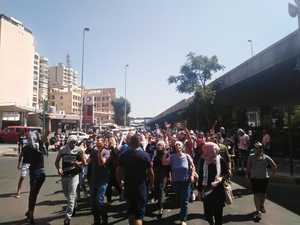Security Forces Prevent Palestinian Protesters from Marching to Parliament

Security forces on Tuesday prevented Palestinian protesters from Marching from the capital’s Cola area towards parliament building in central Beirut.
The protest was organized by the ‘Coalition of Palestinian Refugees Right to Work’ and other institutions and associations operating in Lebanon in protest at “arbitrary measures against Palestinian workers and merchants in Lebanon and their right to live in dignity.”
The demonstrators instead settled for a sit-in under the Cola bridge.
“We had obtained a permission for the demo but we were surprised this morning that people were prevented from leaving camps. We however managed to obtain a permission to hold a rally under the Cola bridge,” an organizer said.
“A large number of the sons of the camps did not manage to reach the gathering point due to strict security measures,” the organizer added.
The protesters are objecting to new labor measures ordered by Labor Minister Camille Abu Suleiman, arguing that the procedures would deprive Palestinian refugees in Lebanon of their incomes.
Several protests have been staged since Monday in rejection of the minister’s move.
Last month, the ministry gave companies a one-month deadline to acquire the necessary work permits.
After the grace period expired last week, it started inspections, closing down non-compliant establishments and issuing others with warnings.
Critics have said the measure essentially targets Syrians who have fled the war next door, but Palestinian refugees living in Lebanon also fear they will be hit.
Palestinians in Lebanon are exempt from paying for work permits, the U.N. refugee agency says.
But Palestinian business owners must still register and pay a quarter of the standard fee.
Abu Suleiman denied the inspections had overwhelmingly affected Palestinians.
"Of the 550 violations registered since last Wednesday, only two concerned large companies owned by Palestinians," he said.
"The Palestinian reaction is incomprehensible," the minister said.
The Palestinian ambassador in Beirut, Ashraf Dabbour, on Monday called on the Lebanese government to exempt Palestinians from these measures.
Palestinian movement Hamas called for "the immediate end to all closures."
Azzam al-Ahmad, from the Palestine Liberation Organization, discussed the measures with Lebanese officials, saying they went against Lebanese-Palestinian efforts "to organize the residency, work and rights of Palestinian refugees in Lebanon."
Around 174,000 Palestinian refugees live in 12 camps across the country, a one-off government census said in 2017.
In 2010, Lebanon's parliament revoked a ban that had barred them from tens of professions for years, restricting them to jobs in fields such as construction and farming.
But Palestinians are still not permitted to work in professions reserved for Lebanese citizens such as medicine, law, the army, and police.
Palestinians began taking refuge in Lebanon with the creation of Israel in 1948, setting up camps that have since transformed into bustling, urban districts.
Their presence has been controversial, with many blaming them for the start of Lebanon's 1975-1990 civil war.
Lebanon says it hosts around 1.5 million Syrians, after they fled the eight-year conflict at home, who have been accused of sparking a series of economic woes in the country.

Most of the predecessors of those people, who are only classed as Palestinians and refugees by UNWRA, and not a single other international organisation left their homes in what is now Israel after their own leadership ordered them to with a promise thay they would be returning within two weeks after the Jews had been wiped out.
Anyone going to the north of Israel nowadays and entering the moslem towns and villages (Shafar'am, Tarshiha, Abu Snan, Majdal Krum, Mazraa etc) will be able to report on the high standard of living that those who remained left for the heir children and grandchildren.